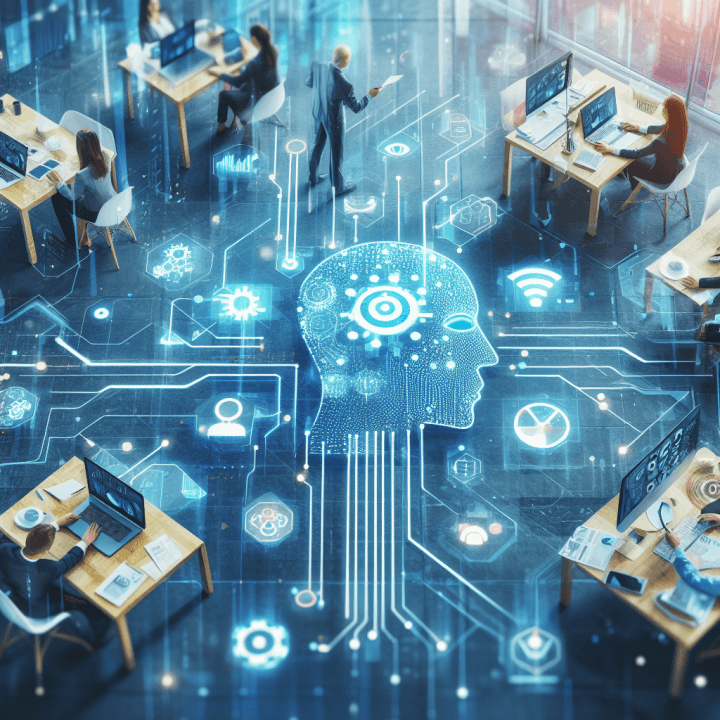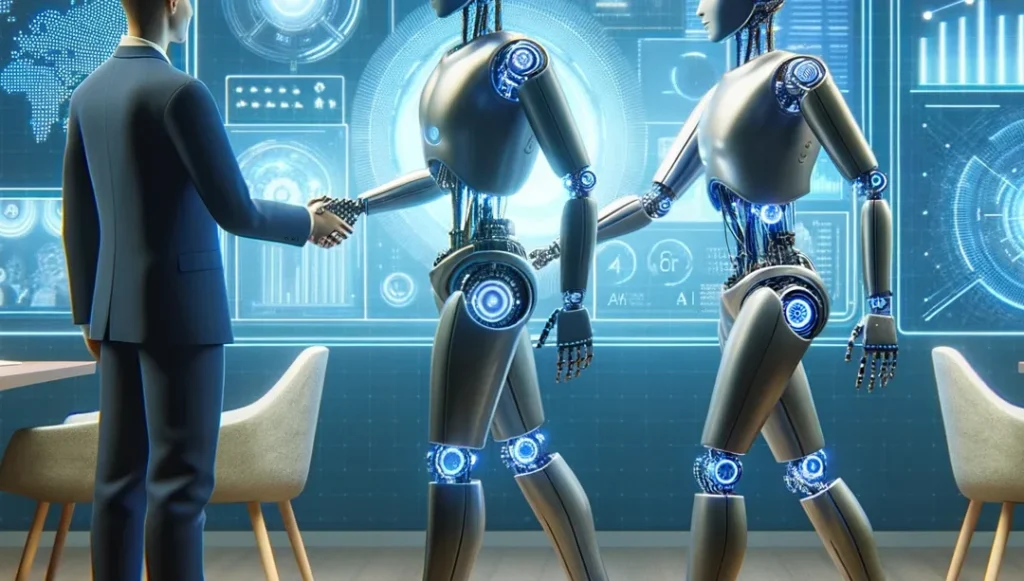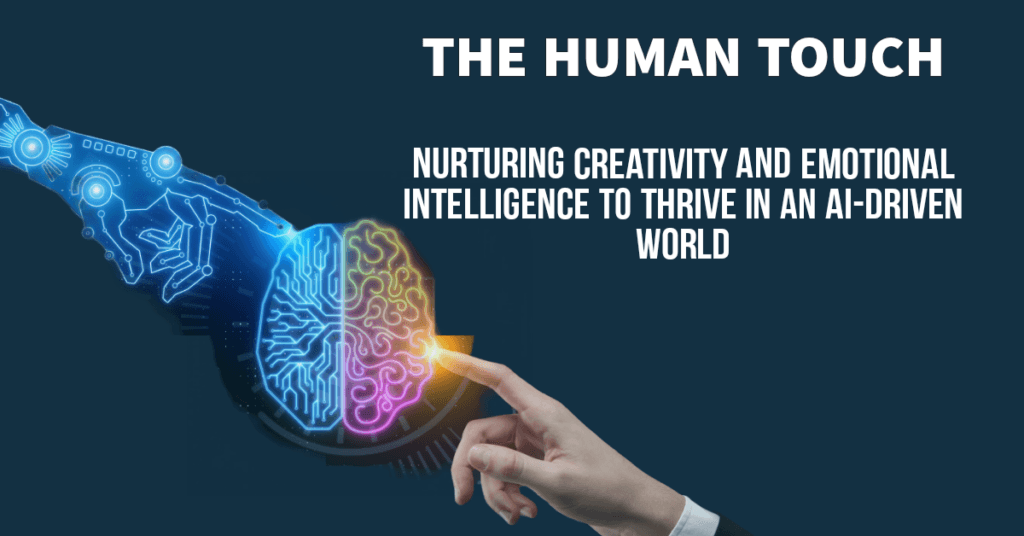AI Impact on Jobs: 5 Key Insights for a Balanced Perspective
Artificial Intelligence (AI) is changing the way we live and work, bringing both good and difficult changes. It can handle simple, repetitive tasks, allowing people to focus on more creative and complex work. AI is also helping businesses come up with new ideas and solve problems, making tasks quicker and human jobs easier. But as Artificial Intelligence grows, some people worry about its impact on jobs. Will AI take over all the jobs, or will it create new ones? It’s important to find a balance as we move to a future where AI and humans work together. Let’s look at five key points to understand how AI is changing jobs and workplaces.
AI Will Automate Repetitive Tasks
One of the biggest benefits of Artificial Intelligence (AI) is its ability to do repetitive and boring tasks efficiently. Machines can perform jobs like data entry, basic customer service, and assembly line work faster and with fewer mistakes than humans. This allows businesses to save time and reduce errors. In customer service, AI-powered chatbots are used to answer common questions instantly. Customers can get quick responses to simple queries, which makes customer service faster and more efficient.

While AI might replace some jobs, it also gives workers the chance to take on more important tasks. For example, instead of doing basic data entry, employees can learn how to manage, program, or understand the data AI systems produce. This change lets workers focus on jobs that need creativity, critical thinking, and problem-solving—skills that AI can’t do. Artificial Intelligence automates certain jobs, it also opens up new roles and opportunities for workers. By learning how to work alongside AI, employees can adapt and upgrade their skills, preparing for the future of work where humans and AI collaborate to improve productivity and innovation.
AI Creates New Job Opportunities
Throughout history, new technologies have often created new jobs, and AI is no different. As AI technology becomes more advanced, there is an increasing need for skilled workers to design, maintain, and improve these systems. Some new job roles include:
- AI Specialists: These professionals design and train AI systems to make them smarter and more efficient.
- Data Scientists: Experts who analyze data to help AI systems make better decisions and predictions.
- Ethics Consultants: Specialists who ensure that AI systems are used responsibly and fairly, avoiding bias and ensuring safety.
Additionally, many industries are seeing new job opportunities because of AI. For example, in healthcare, AI-powered tools are being used to help doctors diagnose diseases. This creates a need for professionals who can interpret Artificial Intelligence results and make sure patients receive the best care. Similarly, AI is impacting fields like education and entertainment, where new roles are emerging to manage and implement AI technologies.

Impact Across Industries:
AI is also creating new opportunities in various industries. For example, in healthcare, AI-powered diagnostic tools are being used to analyze medical images and patient data, helping doctors make faster and more accurate diagnoses. This creates a need for professionals who can interpret the AI’s results and integrate them into patient care.
Similarly, education is seeing new roles emerge as AI is used to personalize learning experiences, automate administrative tasks, and assist in teaching. AI tools can help teachers track student progress and offer individualized support, creating opportunities for educators to manage these technologies.
In the entertainment industry, AI is being used for tasks like content recommendation, video editing, and game design. New roles are emerging to manage these technologies, including AI developers, content curators, and game designers who integrate AI into their work.
In summary, while AI does pose challenges in certain sectors, it also brings significant opportunities by creating new job roles that require specialized skills. As Artificial Intelligence continues to evolve, the demand for these skilled professionals will only grow, providing new career paths for individuals to explore.
Humans Excel at Creativity and Emotional Intelligence
Despite AI’s impressive capabilities, there are areas where humans still outperform machines, such as creativity and emotional intelligence. These traits are crucial in roles like:
- Creative Industries: Writers, artists, and designers rely on human imagination and cultural understanding to produce meaningful content.
- Healthcare: While AI can assist with diagnostics, human caregivers provide empathy and personalized care that machines cannot replicate.
- Leadership and Management: Effective leaders require emotional intelligence to inspire teams, mediate conflicts, and make strategic decisions.
AI may enhance these roles by providing support and insights, but it cannot replace the uniquely human elements required for success. Humans are naturally better at creativity and emotional intelligence than machines. Creativity involves coming up with new ideas, thinking outside the box, and solving problems in unique ways.

While Artificial Intelligence can help with tasks based on patterns and data, it doesn’t have the ability to think creatively in the way humans do.
Reskilling and Upskilling Are Essential
As Artificial Intelligence changes the job market, the importance of reskilling and upskilling cannot be overstated. Governments, organizations, and individuals must invest in education and training to prepare for an AI-driven future. Key areas to focus on include:
- Technical Skills: Learning programming languages, data analysis, and AI system management.
- Soft Skills: Developing adaptability, problem-solving, and interpersonal communication.
- Lifelong Learning: Staying updated with industry trends and embracing continuous education.
By equipping themselves with these skills, workers can remain competitive and secure jobs that leverage both human and Artificial Intelligence strengths. In essence, both reskilling and upskilling ensure workers remain valuable and adaptable as the job market evolves. They help individuals stay relevant in their careers and allow companies to have a skilled workforce ready for new challenges.
Why Reskilling and Upskilling Matter:
Reskilling and upskilling give workers the tools they need to secure jobs that leverage both human strengths (like creativity, emotional intelligence, and decision-making) and AI’s capabilities (like automation, data analysis, and efficiency). By investing in these skills, individuals can maintain relevance in the workforce, even as technology continues to disrupt traditional job roles.
Moreover, reskilling and upskilling ensure that companies have a skilled, adaptable workforce capable of handling new challenges, supporting innovation, and driving growth. Organizations that invest in the development of their employees are better equipped to navigate the changing business landscape, benefiting from a highly skilled and agile team.
In summary, as AI continues to shape the job market, reskilling and upskilling are essential strategies to ensure that workers remain employable and capable of thriving in the future workforce.
Collaboration Between Humans and AI
The future of work is not about humans versus AI but about collaboration. When humans and AI work together, they can achieve remarkable results. Examples include:
- Healthcare: Doctors use AI tools to analyze patient data, enabling faster and more accurate diagnoses.
- Marketing: Marketers leverage AI to analyze consumer behavior and create targeted campaigns.
- Engineering: Engineers use AI-powered simulations to design and test products more efficiently.
This partnership allows humans to focus on strategic thinking and decision-making while AI handles data processing and repetitive tasks. The future of work is not about humans competing with AI, but about working together to achieve great results. By combining the strengths of both, humans and AI can create powerful partnerships that improve efficiency and innovation across various industries.
In healthcare, doctors use AI tools to analyze patient data, which helps them diagnose conditions faster and more accurately. Artificial Intelligence can quickly process vast amounts of medical information, identifying patterns that might be missed by humans, but doctors still make the final decisions based on their expertise and patient needs.
In marketing, AI helps businesses understand consumer behavior by analyzing data on buying habits, preferences, and trends. This enables marketers to create more personalized and effective campaigns, targeting the right audience with the right message. AI handles the data processing, while marketers use their creativity and strategic thinking to craft compelling campaigns.
In engineering, AI-powered simulations help engineers design and test products more efficiently. AI can run countless simulations in a fraction of the time it would take a human, allowing engineers to focus on refining designs and making high-level decisions.
Balancing the Pros and Cons
AI offers tremendous opportunities, but it also brings certain challenges that need to be addressed carefully to ensure that its benefits are shared equitably and responsibly. The main challenges include job displacement, ethical concerns, and economic inequality.
Job Displacement:
One of the biggest concerns with Artificial Intelligence is the potential for job loss, especially in roles that involve routine, repetitive tasks. Many jobs in industries like manufacturing, retail, and customer service are at risk of being automated by AI-powered systems. For example, factory workers may be replaced by robots on assembly lines, while customer service roles could be filled by chatbots or virtual assistants. While AI can increase efficiency and reduce costs for businesses, it can also displace workers who perform tasks that AI systems are better at handling. This shift may create short-term challenges for workers who need to transition to new roles that AI cannot easily replace, such as those requiring creativity, emotional intelligence, or strategic decision-making.
Ethical Concerns:
AI systems often rely on large datasets to make decisions, and these datasets can sometimes contain biases that reflect societal inequalities. For instance, an AI system used in hiring might unintentionally favor certain demographic groups over others, leading to unfair outcomes. Bias in AI can perpetuate existing inequalities, such as discrimination based on race, gender, or socioeconomic background. Additionally, issues around data privacy are significant because AI systems collect vast amounts of personal information. If mishandled, this data could lead to privacy breaches or misuse. Ethical AI guidelines and regulations must be put in place to ensure that AI is used in a fair and transparent manner.
Economic Inequality:
The widespread use of AI could also exacerbate economic inequality. While skilled workers with expertise in AI, data analysis, and machine learning are in high demand, workers in low-skilled or routine jobs may find it harder to adapt. This could lead to a divide where the wealth generated by Artificial Intelligence is concentrated in the hands of a few highly skilled individuals or large corporations. At the same time, those without access to education or training may struggle to find new opportunities in an AI-driven economy. The result could be a widening gap between skilled and unskilled workers, contributing to greater economic inequality.
Solutions for a Fair Future:
To address these challenges, collaboration among governments, businesses, and communities is essential. Governments can play a key role by introducing policies such as universal basic income (UBI), which would provide a safety net for individuals displaced by AI. Education reform is another important step, ensuring that workers have access to reskilling and upskilling opportunities, especially in fields that complement AI, like creativity, management, and complex problem-solving. Lastly, businesses must adopt ethical AI guidelines to ensure fairness and transparency, and develop AI systems that prioritize privacy and eliminate bias.
By actively working together, we can create a future where AI enhances society while minimizing its negative impact on workers and reducing inequality.
Top 10 AI Tools for Small Businesses to Boost Productivity and Growth you want to know!
Conclusion
While AI is transforming the job market by automating routine tasks and driving innovation, it is unlikely to completely replace human jobs. Instead, AI and humans will work together, each complementing the other’s strengths. AI excels at data processing and efficiency, while humans bring creativity, emotional intelligence, and complex decision-making skills to the table.
As AI evolves, it creates new opportunities in fields like healthcare, marketing, and engineering, but it also presents challenges such as job displacement and ethical concerns. Reskilling and upskilling are essential for workers to stay competitive and adapt to the changing landscape. Governments, businesses, and individuals must collaborate to ensure that the benefits of AI are shared fairly and that workers are equipped with the skills needed for future roles.
Ultimately, the future of work lies in collaboration between humans and AI, where both contribute their strengths to drive progress and create new opportunities. By embracing this balanced perspective, we can harness the full potential of AI while maintaining a fair and inclusive workforce.



Very nice information
Keep it up❤🥰